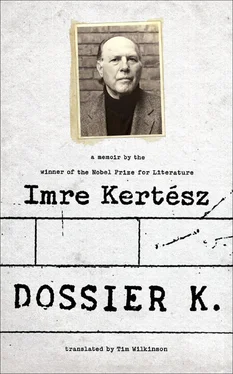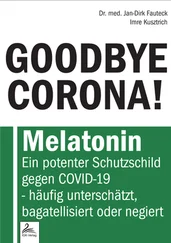A pretty stringent comment, I would say … what, in your view, needs to happen in order that …
I don’t know. I don’t think it’s me you should be asking.
In 2005, a Holocaust museum opened in Hungary, while in Berlin a controversial memorial to the Holocaust was unveiled. The sixtieth anniversary of the liberation of Auschwitz was marked around the world … it goes without saying that you too were invited to these ceremonies .
Certainly, many of the memorial sites honoured me with invitations, but I had to turn them all down.
May I ask why?
Because I didn’t feel strong enough to go, and then I had a job holding back my aversion.
I would ask you to be a bit more precise in stating the reason, however harsh that may be .
I don’t know if I am capable of that. The only people who were not besmirched by the shame of the Holocaust were the dead. It is painful to carry the brand of surviving for some unaccountable reason. You remained here so you could spread the Auschwitz myth; you remained here as a sort of freak. You are invited to attend anniversaries; your irresolute face is video-recorded, your faltering voice, you hardly notice that you’ve become a kitsch supporting character in a fraudulent narrative, and you sell for peanuts your own story, which bit by bit you yourself understand least of all. But instead of mourning your lost story, you complain about your daily food ration. You rake in the breast-beating remorse of the jubilee speeches because you believe the mass is being said for you, and you are late in noticing that you have already played your part and there is no longer any need for you here.
All the same, a few years ago you did visit Auschwitz .
Yes, in 2000 the German Academy chose to hold its regular annual meeting in Cracow, and I couldn’t resist the occasion.
You wrote a memo there that you showed me when we started preparing for this conversation. Would you consider it an impertinence if I were to ask you to make that sheet public, as it contains nothing that it would be improper for others also to hear?
I’ve no objection.
It starts with the dateline: April 3rd, 2000. “With the German Academy to Cracow. Why did I travel on from there to Auschwitz-Birkenau? What was the dare to which I capitulated? What fed the vain sense of satisfaction that haunted me there? I went up into the control tower. The — how should I put this? — the style of the place both enthralled and appalled me. The desolate terrain, that mercilessly expedient landscape, said everything. I walked along the ramp, Magdi beside me. She was silent for the most part, both of us were, but still I was unable to shake off the feeling that I am walking along the ramp, M. beside me. It was a triumphal march, however I look at it. I had gravely offended the spirits of the dead. Was I sensible of this? Among the ruins of the crematorium an academic colleague, a somewhat conspicuously well-dressed German of around fifty, threw himself tearfully into my arms, and I held him as if I were able to bestow absolution on him. It was now that I truly recognized the grotesqueness of the place. I hastily got out, away, away, back to my home, into irredeemable survival from which I have no passage through to a past that is separated from me by barbed wire. Was I aware of this? Or had I simply forgotten? In any event the shame of this excursion will long haunt me …” By then Magdi had been your wife for four years, if I am not mistaken .
You are not mistaken. The wedding was in April 1996.
It roused a fair degree of interest in Budapest at the time. By then you were no longer an unknown author, while Magdi was heading an office for an American venture .
She represented the state of Illinois, setting up commercial and cultural links between Chicago and Budapest. She had returned “home” when Hungary was moving to a democratic system at the beginning of the Nineties, full of enthusiasm after having lived in Chicago for thirty-four years.
I recall a wonderful garden somewhere at the top of Rose Hill in Budapest .
That’s right. M. was renting an apartment there at the time.
There were loads of guests. I arrived just when the ceremony was about to start: a Unitarian priestess was putting on her black cassock. That incidentally was something many people wondered about: Why Unitarian?
Possibly not everyone was aware of the significance of the ceremony. Consummation still invariably evokes for us God’s name. Magdi had to move a long way from the country, and she returned from a long way away so that the two of us might meet, and she was not able to ascribe that to pure chance … as for me, one doesn’t have to be a believer to be receptive to the wonders of life …
But why did you choose a Unitarian ceremony specifically?
May I remind you of what that priest once said to me: “God has no religion.” And the Unitarians — in the person of the minister, Ilona Szentiványi — accepted the two of us: one a Roman Catholic, the other a Jew. We set off for Germany the next day: two weeks together in a hired car — that was the honeymoon. That was when the German translation of Fatelessness appeared.
Were you pleased about the … the …
Yes, it was hard for me, too, to hit upon my verbal relation to that undoubtedly absurd yet nonetheless amazing whatever …
Given that it’s literature we’re talking about in the final analysis, let us dare call it success .
OK, let’s do that.
In 2003, the historian Jan Philipp Reemtsma, head of the Institute for Social Research in Hamburg, asked you to give the opening speech for the reopening of an exhibition under the title of “The Crimes of the Wehrmacht.” In that lecture you spoke directly about the reluctant memory of the survivor. Let me quote you: “I have to admit that I too lived through some difficult days as I leafed through the exhibition catalogue. Had I forgotten, by any chance, that I myself was a participant in and survivor of these horrors? Had I forgotten the scent of dew-drenched daybreaks when the volleys of gunfire would crack? Sunday evenings in the camp barrack block, when the presumptive crematorium fodder were still able to dream about festive cakes? If I had not exactly forgotten, once I had transmuted it into words it had all burned out and somehow come to rest within me. Only grudgingly do I surrender that peace of mind.” But then you have to surrender it after all when you come to the exhibition’s pictures: “Ecce homo— behold a man. Is that him? One day he is called away from beside his wife, his children, his elderly parents, and the very next day he is shooting women, children, the elderly into a ditch, and with evident relish at that. How is that possible? Obviously with the aid of hatred, the hatred which, along with falsehood, has become an indispensable necessity, I might go so far as to say the most important psychological nutriment for mankind in our time …” “I sense hatred as an energy,” you go on to say, “The energy is blind, but its source is exactly the same vitality from which creative forces take nourishment. Hatred, if it is well organized, creates a reality in the same way as even love might create a reality.”
That is a utopia, of course, but there are times when I almost take it seriously.
You said about Liquidation, your most recent novel, that you were casting a final glance at Auschwitz as the lengthening of time is gradually closing down the horizon for you. It’s true that never before have you painted quite such a godforsaken universe; equally, your world has not pulsed as much with a freedom that you can scent from almost each and every line like a light spring breeze .
Читать дальше












